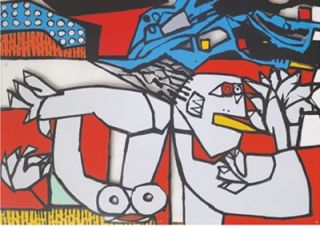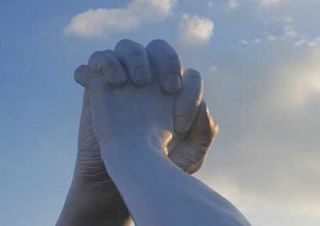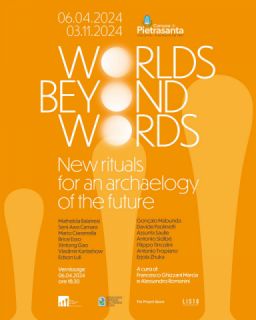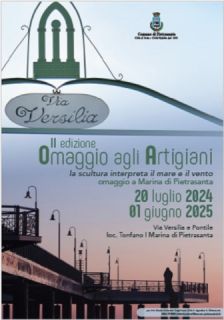Pietrasanta is a diamond set in the heart of Versilia, an enchanting town of medieval origin, which has become a very important center of attraction for Italian and foreign tourists who, throughout the year, populate the streets of the historic center to enjoy its beauty, many works of art and culture of which it is imbued.
Pietrasanta exudes art. Its narrow streets are teeming with galleries, works by important internationally renowned artists and during the summer major exhibitions of well-known and promising young artists are set up.
The atmosphere you breathe has an almost bohemian flavor: the small clubs that overlook the narrow streets of the center or the main square have heard many stories, right there, between a coffee and a glass of wine, ideas and inspirations were born, debates among artists or men of culture, great projects and great initiatives.
It is no coincidence that Pietrasanta is called "Little Athens" because its history has been closely linked to art for centuries. As a matter of fact, Michelangelo stayed there for a long time with his students to work the white marble from the nearby quarries, now famous all over the world.
Over the years Pietrasanta has established itself as a center of international interest for art and sculpture; today it is a place of great interest and meeting place for many famous artists such as Igor Mitoraj, Fernando Botero, Jean Michel Folon, Pietro Cascella, Arnaldo Pomodoro, who have honored the town with their works, as well as the home of illustrious personalities such as Giosuè Carducci.
Pietrasanta is also called an “open-air museum” because in every street, alley, square or roundabout it is possible to admire world-famous sculptures in addition to the numerous art galleries that you can visit throughout the year such as "Giannoni & Santoni Artistic Collaborations" in Via Sauro.
The numerous presence of artistic foundries in the area has also contributed to making this place so coveted and loved by artists.
Noteworthy are also the mosaics that are made in this town and in the surrounding areas: the craft traditions that are handed down from generation to generation and the vast heritage of native materials have meant that the art of mosaic has become increasingly prestigious in Versilia.
From those with a Venetian imprint with the use of gold and silver, to those made with polychrome marble tiles and many other valuable materials (such as semiprecious stones, ceramics, granite, particular glass and enamels), mosaics and artistic micromosaics are produced with the techniques, tools, patience, passion and craftsmanship of the past.
Sometimes the mosaic also becomes an essential part in marble or bronze works, a further synergistic goal between the different artisanal realities present in the Versilia workshops.
The Museo dei Bozzetti (Maquettes Museum) was created in 1984 in Pietrasanta, with the purpose to document the artistic activity of the many sculptors who come here from all over the world to realise their works in the local artisan workshops. This is a special way to tell the story of a work of art and it is no coincidence that it was created right here, where sculpture has been a heritage of fundamental value for centuries.
The maquettes and models represent the sculptor's initial idea before creating the finished work. The dimensions can vary from a few centimeters to colossal works and are generally made of gesso (a gypsum-based paste). They are the testimony and memory of the artist's creative process, all of which gives it an inestimable value.
The collection holds over 700 maquettes and models, of more than 350 Italian and foreign artists.
The works realised on these maquettes today can be seen in museums, collections and parks all over the world.
Botero's frescoes, placed along the two aisles inside the church of the Misericordia, have attracted attention since 1993. The wonder of its shapes, its colors and its characteristic style make these works a real jewel that will leave you speechless.
The two large frescoes represent "The Gate of Paradise" and "The Gate of Hell". In both frescoes you will recognize characters of the modern era and Botero himself, but we won’t reveal nothing else, just go and have a look yourself!
The 36 m-tall bell tower has a simple brickwork appearance, but was originally also to be covered with marble plates. It was finished in the late 15th-early 16th centuries by the Florentine architect Donato Benti. In the interior is a curious helicoidal staircase.
The bell tower of the Cathedral of San Martino in Pietrasanta, dating from the 16th century, has a simple brickwork appereance. About thirty-five meters high was originally to be covered in marble. This work conceals something spectacular inside: an extraordinary self-supporting brick helicoidal staircase, conceived as a giant reverse sculpture carved into a masonry monolith treated as if it were marble and remained almost unknown for about five hundred years.
The bell tower was commissioned by the Collegiate Church of San Martino around 1520 to Donato Benti, a collaborator of Michelangelo. It was built during the time Michelangelo Buonarroti stayed in Pietrasanta with the aim of extracting marble to create the facade of the church of San Lorenzo in Florence. Many scholars agree in attributing the idea of the grand staircase, suggestive and full of chiaroscuro effects, to this majestic artist.
A naturalistic area noteworthy for its beauty but also steeped in culture, the park is an authentic green lung of the Versilia coast, it has got an area of about 800,000 square meters, and is located right next to the beaches of Marina di Pietrasanta.
In 1906 Gabriele D'Annunzio, who loved to ride among the sunny dunes and along the shoreline, stayed there and also appreciated the cool and restful landscape close to the beach, where "the scrub is crossed by wide, informal avenues on which one gallops without noise, as in a dream ".
The poet in this enchanted place composed the famous poem "The rain in the pine grove": if you go walking in the park, his famous verses will echo in your head, and if a little rain falls, the atmosphere will become even more suggestive. .
The Villa La Versiliana is located inside the large Versiliana Park in Fiumetto in Marina di Pietrasanta. The writer Renato Fucini, often a guest of the owners, counts Digerini Nuti, gave it the name “La Versiliana”, at the end of 1800. In 1902 Gabriele D'Annunzio stayed there. The villa occupies part of the ancient wood known for some time as the Macchia di Marina open to the public, home to important art exhibitions, impressive in its architecture. In 1980 the estate was purchased by the municipality of Pietrasanta which turned it into a public park. In the spaces next to the villa there is an open-air theater where the Versiliana Festival takes place during the summer with a rich program that ranges from operas to ballet and concerts of the most famous artists. There are also spaces dedicated to children and the famous Caffè della Versiliana which hosts important debates with illustrious guests every day. The Versiliana Park often hosts fairs throughout the year, for example the Country Garden & Show event, an exhibition-market on life in the countryside scheduled for autumn, Waiting For Christmas dedicated to Christmas, the Art of the Horse in spring , as well as The Art of Embroidery and Lace. These are all events that attract a lot of tourists and over the years they have implemented their success.
Giosuè Carducci, the well-known poet and winner of the Nobel Prize for Literature in 1906, was born in Valdicastello, a small and charming village on the hills of Pietrasanta, on July 27, 1835.
The family house was declared a national monument and you can still admire inside original furnishings, objects and his memories.
In 1838 Carducci moved to Castagneto and later to Florence, but he often returned to his birthplace.
He expressed in his epistles his love for Pietrasanta and for his native place.
A visit to his home is like diving into his poetry ...

Exhibitio by Tano Pisano, tribute to Picasso 50 years after his death

Beautiful setups in Marina and in the center of Pietrasanta

Exhibition project curated by Francesco Ghizzani Marcìa and Alessandro Romanini at the Versilia Archaeological Museum "Bruno Antonucci" in Piazza Duomo in Pietrasanta



Personal exhibition dedicated to Girolamo Ciulla



Virtual Reality Tour dedicated to the great impressionist master

MarguttianA arte arrives in Tonfano for its 63rd edition

Personal exhibition by Roberto Giansanti organized on the occasion of the "Pietrasanta in Concerto" Music Festival at the Sala delle Grasce of the Sant'Agostino Complex - Via Sant'Agostino n.1

The exhibition will be held at the Sala del San Leone, Via Garibaldi 70, Pietrasanta

Exhibition held in the former municipal building Piazza Matteotti, Pietrasanta

"The sculpture interprets the sea and the wind: homage to Marina di Pietrasanta”
Tonfano, Via Versilia and Pontile

The Carducci Prize is the recognition of the first Italian Nobel Prize for literature